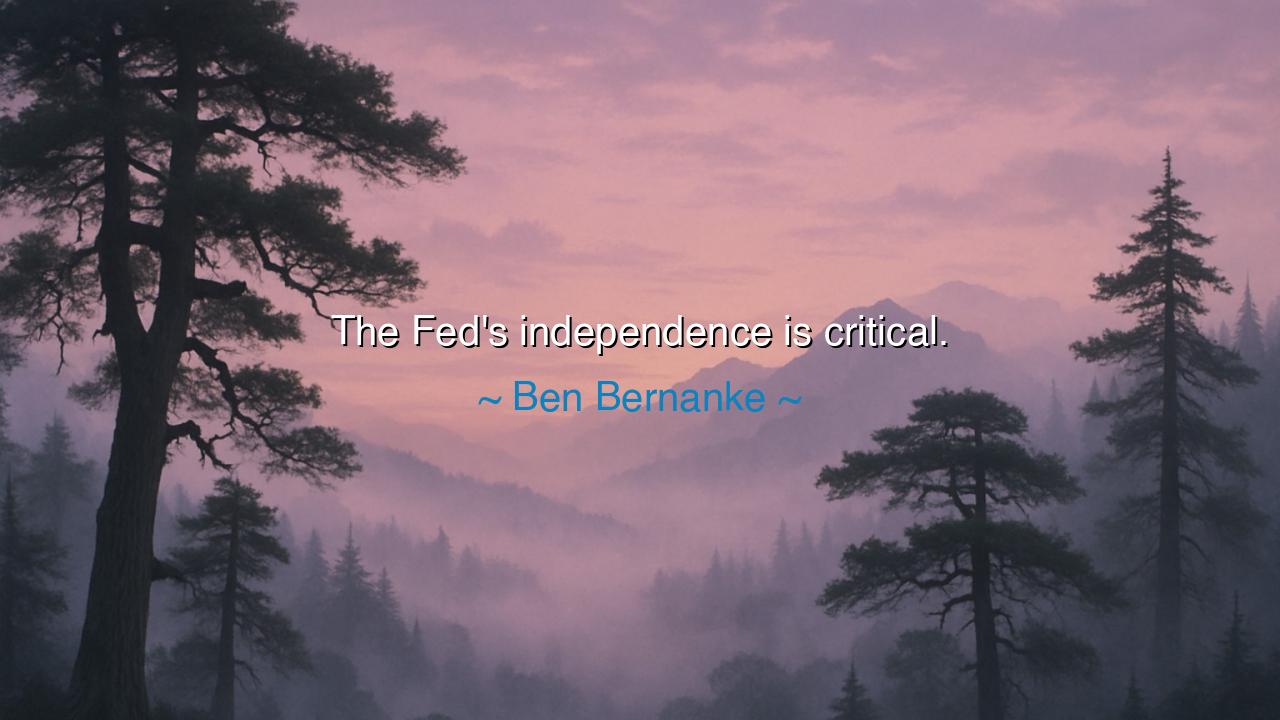
The Fed's independence is critical.






“The Fed’s independence is critical.” — Ben Bernanke
In these calm yet powerful words, Ben Bernanke, the former Chairman of the Federal Reserve, speaks not only as an economist but as a guardian of stability in an age of uncertainty. His statement may seem simple, even technical, but beneath its surface lies a truth as ancient as governance itself: that independence — the freedom to act according to wisdom rather than whim — is the foundation of trust and endurance. When Bernanke declares that “The Fed’s independence is critical,” he does not speak of mere bureaucracy or balance sheets; he speaks of the sacred duty of stewardship — of protecting a nation’s economy from the tempests of politics and passion. It is a lesson in restraint, foresight, and the quiet heroism of patience amid chaos.
The meaning of this quote rests in the delicate balance between power and principle. The Federal Reserve, known as “the Fed,” is the central bank of the United States, the unseen heart that regulates the flow of money through the arteries of the nation. Its duty is not to serve political masters but to safeguard the long-term health of the economy — to preserve price stability, ensure full employment, and guard against collapse. Bernanke’s words remind us that when such an institution bends to the winds of political will, the economy becomes like a ship steered by the storms of popularity rather than the stars of prudence. To remain effective, the Fed must be independent, guided by data, reason, and experience — not by the momentary desires of those who seek quick gain or short-term glory.
The origin of Bernanke’s conviction was forged in the furnace of crisis. As the Chairman of the Federal Reserve during the Great Recession of 2008, he faced one of the most perilous moments in modern financial history. The world trembled as banks failed, markets collapsed, and ordinary people feared the loss of their livelihoods. In that hour, Bernanke’s resolve to act decisively and independently — cutting interest rates, rescuing failing institutions, and injecting liquidity into the system — saved the global economy from ruin. Had he waited for political approval or bowed to popular anger, the result might have been catastrophic. His independence allowed him to act swiftly, as a healer rather than a politician, preserving the faith that economies, like civilizations, depend upon: the faith that tomorrow can still be built.
The wisdom of his words echoes far beyond economics. For independence, in all its forms, is the root of sound judgment. The ancients taught that a ruler’s greatest virtue was temperance — the ability to resist the temptations of impulse and act according to justice and knowledge. The Fed’s independence mirrors that same virtue: it is a shield against the recklessness of human nature. History bears witness to what happens when such independence is lost. In the years between the World Wars, nations like Germany and Hungary allowed their central banks to become tools of government spending and manipulation. The result was hyperinflation, where money lost its value and families carried wheelbarrows of cash to buy a loaf of bread. In every case, when independence fell, trust followed — and when trust dies, the economy dies with it.
But Bernanke’s message is not for bankers alone; it is for every soul who would lead, govern, or create. He teaches that true authority requires independence of thought. Whether one governs a nation, a household, or oneself, wisdom cannot flourish in the shadow of fear or flattery. Just as the Fed must act without bowing to political pressure, so must individuals act without yielding to the pressure of the crowd. The discipline to choose what is right over what is easy is the foundation of integrity. Bernanke’s lesson is thus both civic and personal: independence is not isolation, but moral courage — the strength to follow truth even when the world clamors for convenience.
The lesson of this quote is therefore one of stewardship and self-mastery. Independence must be protected, not because it grants power, but because it preserves responsibility. Just as the Fed must remain separate from politics to ensure the stability of the nation’s currency, so must every person cultivate independence of mind to ensure the stability of their own soul. In a world driven by noise, speed, and opinion, we must learn to pause, to reason, and to trust in principle over popularity. For just as an economy built on debt cannot endure, neither can a life built on the borrowed opinions of others.
Thus, let the wisdom of Ben Bernanke be remembered as a teaching for both nations and individuals: “The Fed’s independence is critical.” For independence, wherever it is found — in institutions, in conscience, in spirit — is the guardian of all that endures. Without it, truth becomes fragile, decisions become corrupt, and the fabric of society frays. But with it, balance is restored, trust is renewed, and progress becomes steady once more. Let every leader, every citizen, and every soul who walks the path of responsibility remember this: that independence is not the privilege of the strong, but the duty of the wise — and that the fate of every great endeavor depends upon its preservation.






AAdministratorAdministrator
Welcome, honored guests. Please leave a comment, we will respond soon